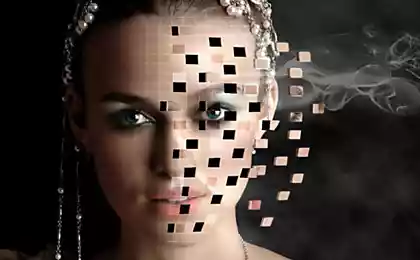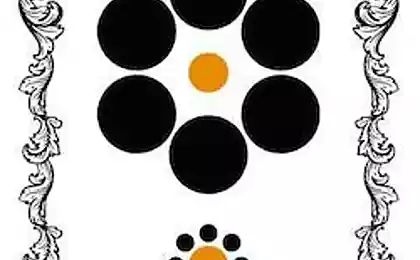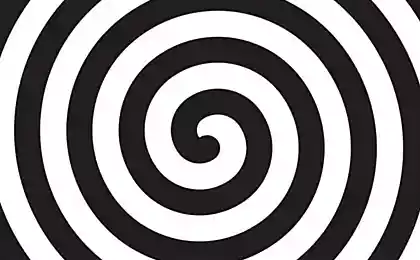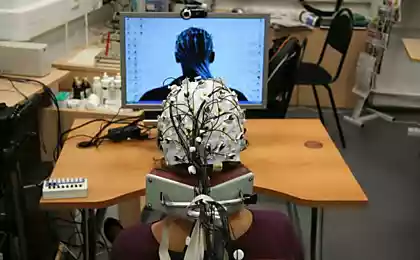Check your perception of sounds, "you were asked not to interrupt me? - Asked in a dark basement pub north London Sophie Mikins his listeners. - You can interrupt me if you want. Just does not make sense, because I do not listen to you ».
It just kind of joking. Mikins almost nothing to hear, and to make out conversations that revolve around her, she needs a lot of effort. The topic of her speech - and hearing strange jokes that can play with us our ears.
To illustrate his theme, it is reproduced several auditory illusions, and it was the strangest sounds I've ever heard. I was amazed at how easily these terrible sounds futuristic shared the view of the audience. Just as the famous photograph #TheDress forced the world to argue about the color of the images on her dress, the record has been challenged our assumptions about how each of us perceives the world.
We often say that not seeing is believing, but I never realized how fragile and can be deceiving our ears. As soon as I came out of the basement of the pub and ended up in the hustle and bustle of Kings Cross Station, I wondered how much of what I hear, created by my brain. My perception of sounds never be the same.
We are often told that not see is to believe, but I've never understood, how fragile and misleading can be our ears h4> Wanting to learn more, two weeks later, I met with Mikins in her lab at University College London, and she told a little more about his career.
Despite the support from teachers, at first she refused to study the neurobiology of hearing. But in the end one staff college managed to convince her to explain why it can be very fruitful for her work. "He flattered me by saying that I might discover something new about how people hear, - she says. - And I thought, yes, I can ».
Today, her research mainly lies in understanding how we conduct ourselves with a high level of noise - for example, during a lively party. It turns out that, even when we are engrossed in conversation, our brain at the same time controls the background talking to do at some point in our speech quieter. Now she spends scintigraphy of the brain to find out how this additional work is carried out, without making it confusing and our tongue-tied.
At the end of the conversation, Sophie told about hearing illusions. "People do not know that sound that I hear, can not match the sound that they hear others", - she says.
The first example Mikins, which she led during his speech - "The paradox of Triton" - can seem deceptively simple, but it perfectly demonstrates this principle. Below you can listen to it.
Paradox тритонаhttps://w.soundcloud.com/player/?url=https%3A//api.soundcloud.com/tracks/200781927&auto_play=false&hide_related=false&show_comments=true&show_user=true&show_reposts=false&visual=true
You can hear four pairs of notes. The second note in each pair of higher or lower? Enabling this record in a dark basement of a London pub, Mikins requested that we raised their hands when raising or lowering hear music. The audience was divided - 50:50. In particular, the band insisted that they knew where the sound is coming.
And as well as different perceptions of color dresses, it introduced into confusion, especially when I realized that I was standing next to the man heard not the same. "This is a concern because we want to feel that we are all alike perceive the world" - says Mikins.
In fact, there is no right answer. Each note is a collection of different computer-generated tones separated by an octave. Thus, it is impossible to say whether the tone of the next higher or lower scale.

Ironically, according to research by Diana Deutsch of the University of California San Diego, our answer is likely to depend on our accent or language, for example, Californians tend to come to the conclusion completely opposite conclusions from the people of England. For this reason, it considers that the manner of speech, planted in childhood, can somehow shape the way in which our brain associates with musical notes. (According to this principle, and Deutsch discovered that repeating words may sound like singing, perhaps recalling the ancient relationship between music and language.)
The same computer-generated, mixed colors help create the next deafening sound:
Illusion increase звукаhttps://w.soundcloud.com/player/?url=https%3A//api.soundcloud.com/tracks/200780974&auto_play=false&hide_related=false&show_comments=true&show_user=true&show_reposts=false&visual=true
What do you hear? Many people hear the sound of constantly rising. In fact, this cycle - a new rising tone begins, when it ends early.
This creates an audible and visual equivalent of perpetual motion. Christopher Nolan has used the same trick in "Dark Knight", creating a feeling of constant acceleration engine speed Betpoda. And, as noted Mikins using this trick with audio series was created dizzying "endless ladder" in the video game "Mario 64»:
During our conversation Mikins showed me the site of Diana Deutsch, who is the fount of other hallucinogenic sounds. For example, consider this:
The illusion of ghostly словаhttps://w.soundcloud.com/player/?url=https%3A//api.soundcloud.com/tracks/200781647&auto_play=false&hide_related=false&show_comments=true&show_user=true&show_reposts=false&visual=true
What have you heard? It seems obvious that a woman's voice endlessly repeats the phrase: «No way». But other students disagree, arguing that they hear one of these words: window, welcome, love me, run away, no brain, rainbow, raincoat, bueno, nombre, when oh when, mango, windowpane, Broadway, Reno, melting , Rogaine.
It illustrates how our expectations shape our perceptions, says Deutsch. We expect to hear the word, and our brain transforms the fuzzy data into something more specific. The power of expectations can also form the basis of those awkward situations when you hear clearly wrong uttered the phrase.
Likewise, consider this controversial sound:
Scale иллюзииhttps://w.soundcloud.com/player/?url=https%3A//api.soundcloud.com/tracks/200781457&auto_play=false&hide_related=false&show_comments=true&show_user=true&show_reposts=false&visual=true
Deutsch found that right-handed people usually hear high tones right ear and left-handers - left or two ears simultaneously. This is a prime example of how small individual differences in brain structure can radically change our perception. But we completely forget that our feelings are very different from the feelings the person next to us.
Right-handed people usually hear high tones right ear, and the left-hander - the left or the two ears at the same time h4> The ability of the brain to shape and improve our feelings usually helps us to navigate the world, so, for example, we can hear the cry of "stop" flow traveling through the noise of machinery. Mikins compares this hearing disorder with a plate of spaghetti, which, somehow, the brain can unravel each "thread" of sound.
"Every day you get a kind of detective, walking on the trail of sounds, because get a lot of ambiguous information and decrypts it, doing it so well that not even notice it," - she says.
"This study made me experience a great sense of respect for his ears, because all their sounds reaching my brain miraculously turns into something that makes sense," - adds Mikins. Illusion, thinks she can make all of us a little longer to appreciate this miracle: "Just hearing these strange sounds, you suddenly realize what you are doing something really complicated».
via www.bbc.com/future/story/20150420-the-strangest-sounds-in-the-world
























